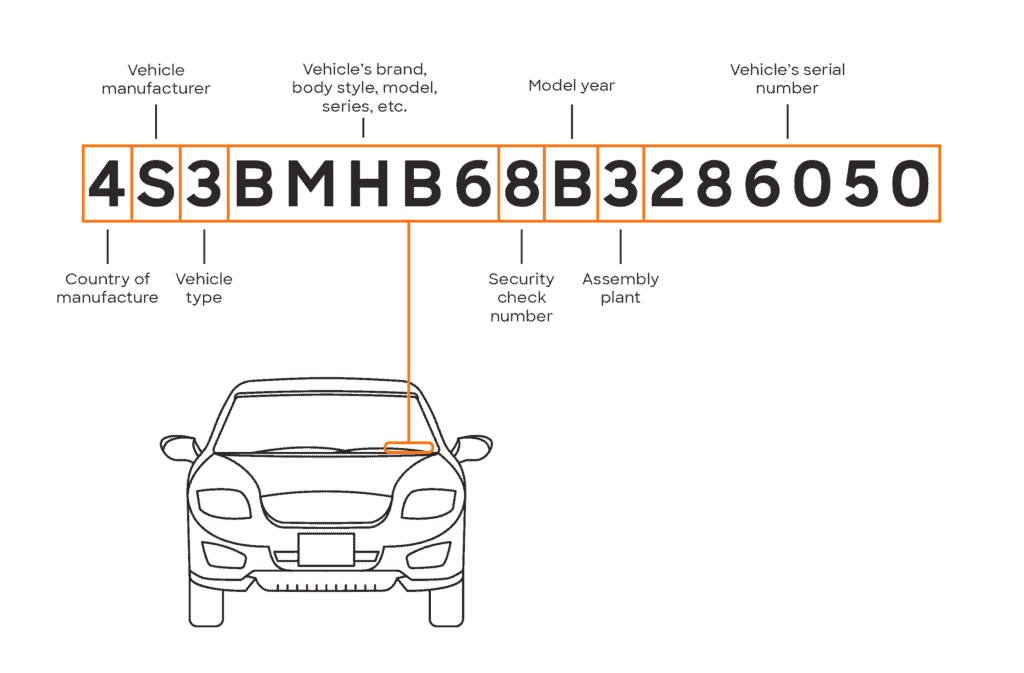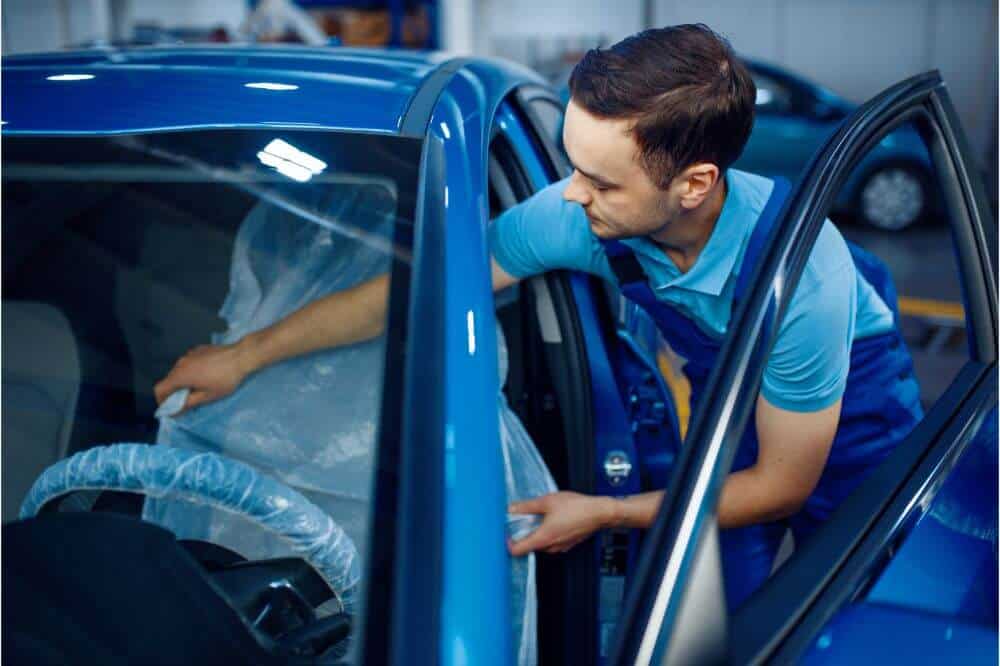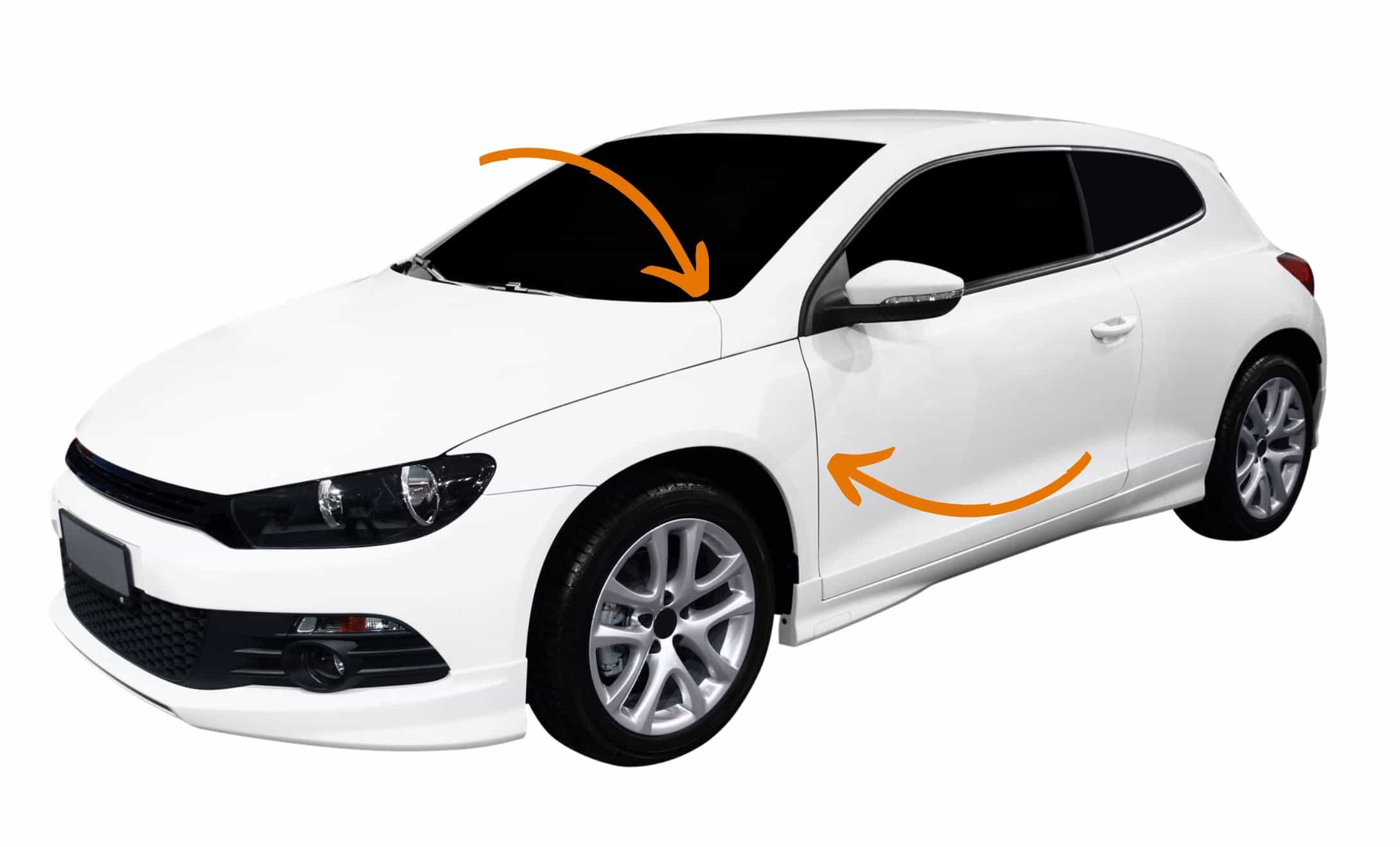DECODE YOUR VIN INSTANTLY
CHECK THE VIN OF YOUR SELECTED CAR RIGHT HERE
NEW!
CHECK YOUR LICENSE PLATE INSTANTLY
CHECK THE LICENSE PLATE OF YOUR CAR HERE
When it comes to cars, you’ve probably heard of the VIN or vehicle identification number. But knowing how to read a VIN is important. This is a number every vehicle has, which is unique to it. There are many things which a VIN can tell you, such as the location of manufacturing, the year, the model, the make, and so much more.
That said, reading a VIN is easier said than done. Did you know that there are a total of 17 characters present in a VIN number? This means that a simple 17 digit VIN can provide you with a lot of information about a given car. But, how do you read them?
How to Read a VIN – The Digits of a VIN
We want to show you what each of those letters or numbers in a VIN mean. There may be a lot to deal with, but once you become familiar with it, it’s actually quite easy to grasp.
The World Manufacturer Identifier
The first 3 digits in the VIN number are the WMI or the world manufacturer identifier. These first 3 digits or letters will tell you where the vehicle was made and what kind of vehicle it is.

The First Position
The very first number or letter in the VIN (this may be a number or a letter), tells you in which region of the world the vehicle was made, on which continent. Here is what the letters and numbers mean.
- A, B, C, D, E, F, G, and H are made in Africa
- L, K, L, M, N, and P are made in Asia
- S, T, U, V, W, X, Y, and Z are made in Europe
- 1, 2, 3, 4, and 5 are made in North America
- 6 and 7 are made in Oceania
- 8 and 9 are made in South America
The Second Position
The second number also tells you where the vehicle was made, but instead of the continent, this second digit tells you in which country the car was made. There are over 600 VIN country code combinations out there (first digit or letter + second digit). To find out exactly where your car is from, you will need to look these codes up.
The Third Position
The third digit in the VIN number indicates the manufacturer of the car or the type of vehicle that it is; this will depend on the manufacturer. In most cases it will inform you if the vehicle in question is a car, truck, bus, SUV, and so on.
Vehicle Descriptor Section – VDS
The vehicle descriptor section ranges from the fourth to the ninth digit, and this will provide you with important information in regards the specs of the vehicle, among other information.
Positions 4 Through 8
The fourth, fifth, sixth, seventh, and eighth digits in a VIN number, depending on the specific manufacturer, can stand for a variety of things. Before you try and decode the VIN on your own, you need to look up what these numbers mean for your specific manufacturer. These digits can stand for things such as the vehicle model, body style, engine type, engine code, restraint system, and other such details.
The Ninth Position
This is an interesting part of the VIN number, as this ninth digit does not actually tell you anything about the vehicle itself. This is called the VIN check digit, and it’s used to see if you have the correct VIN. In other words, it’s a security measure to help separate legit VIN numbers from fraudulent ones.
Vehicle Identifier Section – VIS
The remaining digits, 10 through 17, form the vehicle identifier section. These digits inform you of various aspects concerning the vehicles manufacturing date, features, options, and so on.

The Tenth Position
The 10th digit in the VIN is actually a letter, and each letter coincides with a specific year of manufacture. It tells you what the model year of the vehicle is. You can use the below table to figure out which letters coincide with which dates.
Before you take a look at this list, it is important to realize that each letter or number has 2 different years assigned to it. You need to find out which one of these applies to your specific VIN. To do this, look at the 7th number or letter in the VIN.
If the 7th position is a number, then your vehicle was made before 2010, and if the 7th position in the VIN is a letter, then the vehicle was made after 2010.
- A = 1980
- B = 1981
- C = 1982
- D = 1983
- E = 1984
- F = 1985
- G = 1986
- H = 1987
- J = 1988
- K = 1989
- L = 1990
- M = 1991
- N = 1992
- P = 1993
- R = 1994
- S = 1995
- T = 1996
- V = 1997
- W = 1998
- X = 1999
- Y = 2000
- 1 = 2001
- 2 = 2002
- 3 = 2003
- 4 = 2004
- 5 = 2005
- 6 = 2006
- 7 = 2007
- 8 = 2008
- 9 = 2009
- A = 2010
- B = 2011
- C = 2012
- D = 2013
- E = 2014
- F = 2015
- G = 2016
- H = 2017
- J = 2018
- K = 2019
- L = 2020
- M = 2021
- N = 2022
- P = 2023
- R = 2024
- S = 2025
- T = 2026
- V = 2027
- W = 2028
- X = 2029
- Y = 2030
- 1 = 2031
- 2 = 2032
- 3 = 2033
- 4 = 2034
- 5 = 2035
- 6 = 2036
- 7 = 2037
- 8 = 2038
- 9 = 2039
Positions 11 Through 17
This is the part of the VIN where the manufacturer enters specific information pertaining to the vehicle. Exactly which digits mean what is going to be different from one company to another, so this is something you will have to do some research on. This could be information such as the extra options the vehicle comes with, the production sequence number, the assembly plant, and more.
VINS with Fewer Than 17 Characters
Something to be aware of is that vehicles made before 1981 often have VIN numbers shorter than 17 digits, sometimes 13 digits. So, how to read a VIN for these vehicles, the formula for decoding the VIN will be different. That said, modern vehicles usually always have 17 digit VIN numbers. See this article for tips on how to read a VIN on older vehicles.
Where do I Find VIN on a Car?
Finding the VIN on your car shouldn’t be very difficult. However, the key thing to understand is that different makes, models and ages of vehicles have resulted in the VIN location being different on vehicles.
The good thing is that the number of locations across this range of variables isn’t huge, so we’ll give you all of these below.
On the vast majority of cars, you can find the VIN on a car located on the front of the dashboard on the driver’s side, right under the bottom corner of the windshield.
If the VIN on your vehicle is hard to read from the inside, it might help to stand on the outside of the vehicle and look in through the windshield on the driver’s side.
If you are unable to locate the VIN in this location, there are a few other spots where you may find it. One such spot is on the driver’s side door.
You should be able to find the VIN on a car door jamb or the pillar of the door. Some vehicles may also display their VINs on the passenger’s side door post.
Other Locations of the VIN
There are also some other locations which you can check the VIN for if all else fails. If you cannot find the VIN on the dash or the doors, check the following locations.
- The engine frame or chassis
- The radiator support bracket
- The trunk
- The front end of the frame or chassis, with the door open (for older vehicles)
- Stamped number on the front of the engine block
What if I can’t See the VIN on My Car?
If you are having trouble finding the VIN on a car, there are a few other places you can check. Although not actually on the car itself, these ways of finding the VIN are sure to provide results.
- The vehicle’s title
- Vehicle registration documents
- Insurance documents
- The owner’s manual
If all else fails, and you can’t find the VIN anywhere, you can also call the dealership where the vehicle was originally purchased.
You may also attempt to contact the manufacturer themselves, as they should have detailed records of all vehicles they produced.
Whilst they may not be able to give you the exact VIN of the vehicle you’re looking at, they maybe able to help you find the VIN on a car by stating where they normally install the VIN plate on their models of vehicles.
The Importance of a Vehicle Check
There are a variety of reasons for why it’s important to get a vehicle VIN check. Yes, it is best done before you purchase a used vehicle; however, even if you only manage to do the vehicle check prior to purchasing a preowned vehicle, it’s still better than nothing at all.
There is a lot of crucial information that you can get from running the VIN and checking the vehicle.
Mileage and Odometer Statistics
A vehicle check can tell you how far the vehicle has traveled over the course of its life. It can tell you how many miles the car has on it and how many miles were driven per year on average.
This is a good indicator of how old the vehicle is and how much it was used. Of course, you can have 2 cars, each 10 years old, but if one only has half the miles than the other one, you can guess which vehicle is likely to be in the better condition.
Another important piece of information from a simple vehicle check, also related to mileage, has to do with odometer rollbacks. Sometimes odometers are rolled back, which makes it appear as though the vehicle has traveled fewer miles than it actually had.
It’s a really sneaky trick, because if you purchase a vehicle that has had an odometer rollback, you could be in for a nasty surprise.
Information on Recalled Components
Another reason why it’s important to get a https://vehiclecheck.ca/ before purchasing a used vehicle is because you want to know that all of the components in the vehicle are safe and road worthy.
The unfortunate reality is that many car manufacturers and retailers sell vehicles that may have defective components. It y would not be the first time that a set of brakes, a steering wheel, airbags, and other components have been recalled due to defects — this is all about your safety.
You don’t want to end up purchasing a vehicle that had a recall issued on the airbags, only to find out that the airbags were never actually replaced with functioning ones.
A vehicle check will inform you if any other components of your vehicle have ever been subject to a recall. You’ll also determine if the recall was executed on your vehicle and if the defective parts were replaced. Vehicle component recalls are done for the safety of all those on the road, especially you.
A Lien Check
Something that is very unfortunate, but happens more often than you might think, is that used vehicles still have liens on them. Liens are when you use something like a car as collateral to get a loan, or a mortgage.
The previous owner of the vehicle may have taken out a lien on the car to get a loan. But, what happens when the previous owner stops paying off that loan and has an outstanding debt? The creditors are going to come after the collateral, which in this case might be the vehicle you purchased.
You should always get a vehicle check because it would be unfortunate to wake up one day, be ready for work, and to see the repo man hauling your car away due to somebody else’s unpaid debt.
Doing a vehicle check prior to the purchase can help ensure that your vehicles aren’t caught up in some financial web of deceit.

What the Vehicle was Used for
Although this may not be quite as important as some of the other information you get from a vehicle check, is knowing what the vehicle was used for.
After all, there is going to be a difference in the condition of a car if it was strictly for personal use or if it was used as a police car, taxi, or rental vehicle.
It might not be the No. 1 indicator of the condition which the car is in, but it’s still something which many like to be informed of. If you find that your vehicle was used as a taxi for 5 years, it might be a good idea to get it thoroughly inspected.
Service History Information
Another reason why performing a vehicle check before making a purchase is important is because it can tell you the service history of your vehicle.
You will find out how often the vehicle was serviced, if it was serviced at the proper intervals, and if all necessary maintenance was kept up. You don’t want to buy a used vehicle only to find out that the oil was barely changed and the tires never rotated.
A detailed overview of the service history of your vehicle can go a long way in telling you what kind of condition it is in. If service was regularly performed, you can rest assured that the vehicle in question is most likely in fairly good condition.
However, if the vehicle’s service was frequently neglected, you might want to think twice about purchasing that specific vehicle.
Damages
The next important reason why you should always perform a vehicle check before making a purchase is to find out if the vehicle was ever severely damaged. A vehicle check can inform you of previous flood and hail damage, collision damage, and more.
You want to know if your vehicle has ever been in a collision, what parts of the vehicle were damaged, and whether any components had to be replaced, or are still damaged. Knowing that your vehicle does not have any existing structural damage, such as to the frame, is crucial to your own safety.
Not only is it crucial for safety, but for saving money. After all, making a vehicle with existing structural damage roadworthy is going to cost a lot of money and work put into it, if it’s even possible to make it roadworthy again. Even if the vehicle you have purchased was damaged in some way, at least you can tell whether or not it was properly repaired.
Airbag Deployment and Salvage Info
Related to the above point, whether or not the airbags were ever deployed is also an important thing to know — which a vehicle check can inform you of.
This lets you know that the vehicle was in a collision severe enough to cause the airbags to deploy. You might think that you are getting a great deal on the vehicle, only to find out that it was previously wrecked in a crash.
If the car was wrecked in a crash, it was either junked or salvaged. Salvaging cars is fine if the specific vehicle is salvageable.
If your previously owned car was salvaged, it’s something you want to know about, and you also want to know which parts were salvaged and which were replaced. This will give you a good idea of what kind of condition the car is in, the structural integrity, and what future repairs and service intervals might look like for you.
Branding and Registration
You will want to know if your vehicle has any branding associated with it. When a vehicle has been branded, it means that it has a permanent designation assigned to it.
These are assigned to components such as the registration, permit documents, and the title. This can tell you if the vehicle was written off due to damages, collisions, fires, floods, and other such things.
A car which has been in a major collision will be branded as such, or for instance, if there was a total loss suffered, this is something else that you can tell from the branding and registration information. It’s just a really good overview of the important history of the vehicle.
Making Sure it’s Legal
It wouldn’t be the first time that somebody has tried to sell stolen goods. This is something that does happen in the used car market, more frequently than most of us would like to admit, but it does happen.
People steal cars and then try to sell them, claiming that they are legal and legit. A vehicle check will tell you if the vehicle has been reported as stolen.
If you buy a stolen vehicle, if you ever get pulled over, you could land in hot water. Driving around in what essentially amounts to a stolen vehicle isn’t going to look good in a court of law.
Information on the Warranty
Just like with anything else you might purchase, whether brand new or secondhand, something you always want is a decent warranty. If something breaks or any component in your vehicle fails, through no fault of your own, you want to know that you are covered.
However, when you buy a used vehicle without doing a check, you might purchase one that has no warranty left on it. If you are buying a fairly old vehicle, this can be a problem.
Chances are that something will break down sooner rather than later, and if you aren’t covered by a warranty, you’re going to be responsible for the full cost. Many used cars, especially older ones, won’t have a warranty left on them, but it’s still a valuable thing to know either way.
Previous Insurance Claims and Total Losses
Another reason why it’s a good idea to do a vehicle check is to find out whether or not there were any previous insurance claims made on your vehicle. Of course, if there were previous claims, chances are almost 100% that your insurance premiums for that same vehicle will be more substantial.
Moreover, with a vehicle check, you can quickly find out if your vehicle was ever ruled to be a total loss. This means that the total money which the insurance company would have paid out would have been less than the repair or salvage costs.
This has made it more cost effective for the original owner to replace the damaged vehicle rather than to repair it; a car that is a total loss or write-off is not likely to be in good condition.
DECODE YOUR VIN INSTANTLY
CHECK THE VIN OF YOUR SELECTED CAR RIGHT HERE
NEW!
CHECK YOUR LICENSE PLATE INSTANTLY
CHECK THE LICENSE PLATE OF YOUR CAR HERE



